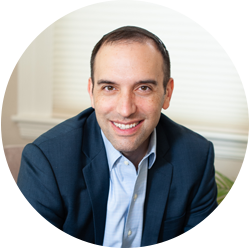Shalom Chaverim (Dear Friends),
As we settle into this new reality (still changing by the day), CJP’s staff continues to focus on caring for our most vulnerable, supporting our ecosystem of Jewish institutions, and ensuring that our community can stay meaningfully engaged with Jewish life during this time.
Thanks to more than 300 gifts from generous donors, our Coronavirus Emergency Fund has just exceeded $1 million, and we made our second round of distributions this week. We are regularly updating information about the fund and its impact.
I have spent many hours this week on video calls with leaders from Jewish Federations and foundations across the country, discussing our national response to the challenges that we, and every community, are now facing. As we begin to better understand the economic stimulus package, CJP will ensure that our local institutions and Jewish professionals have the information they need to access available funds and support. We will also coordinate our local relief efforts with any collective efforts happening across the country.
JewishBoston.com’s dedicated coronavirus page continues to serve as a digital hub to keep our community connected.
Their designated site includes information for those in need of critical resources and support, including how to access the CJP Warmline, a service that coordinates community efforts to help people with urgent financial needs, food, and job assistance. Please direct anyone you know who is experiencing hardship right now and could use support, to the Warmline. As one Warmline client said, “people were there to help us. So physically, emotionally, and financially, things got better.”
JewishBoston.com is also curating and highlighting opportunities to engage in virtual Jewish life and learning across the community, from children’s groups to adult classes, and Shabbat services to upcoming Passover seders. I look forward to seeing many of you at our weekly CJP virtual Shabbat candle lighting, “Friday Night Lights,” tonight and every Friday at 6:30 p.m.
I’m particularly excited about an initiative that we launched yesterday to provide prepared Passover meals to people in our community who are most in need. Working with our social service agencies and synagogues, we want to ensure that, in the words of the Passover Haggadah: “Let all who are hungry, come and eat; let all who are in need, come and join our Passover ritual." If you know someone in need, please email David at CJP.
Reflections on “Calling” One Another
Earlier this week I had the privilege of taking part in the opening plenary of the Jewish Funders’ Network’s (JFN) virtual conference. The JFN connects people and ideas across the country to grow the size and impact of Jewish philanthropy. The organization’s CEO, Andrés Spokoiny, opened the conference with a powerful message about the moment we are in.
Referencing the hauntingly relevant Camus classic, The Plague, Andrés described a paradox of crisis: “There is a paradox in the plague; people wear masks to protect themselves; but, in fact, the plague makes the masks fall and reveal our true selves.”
Crisis tests and reveals our true selves, something that I’m sure many of us are experiencing and witnessing frequently right now. During the event, I was asked to share a Jewish perspective on “what it means to be a mensch (a person of integrity and honor)” at a time like this.
As I reflect more on this question, I think there is a powerful lesson in the opening words of this week’s Torah portion, which also opens a new book of the Torah. In English, this third book is called Leviticus, named after the Levites (one of the 12 tribes of Israel), around whom much of the book revolves. But, in Hebrew, it is called “Vayikra,” which means “And He (God) called (to Moses).” The book is named after calling.
The opening line reads, “And God called to Moses and He spoke to him…” If God spoke to him, why does Heneed to call to him? The great medieval commentator, Rashi, suggests that God calls before He speaks or commands as a sign of affection. God establishes a connection, a relationship, before getting down to business.
“Calling” certainly takes on new meaning in a world of all-day Facetime, Microsoft Teams, and Zoom. In the Torah, the word is teaching us what it means to be relational rather than transactional. At a time when we are moving so quickly, responding to urgency, living in the face of insecurity — and doing all of this remotely — it can be easy to forget the human being on the other side of the screen. To be a mensch right now is, like God did with Moses, to take the time to call — to see, to honor, and to engage with the humanity of people from whom we are distanced.
This means slowing down and remembering to put people before productivity. Starting a call with a personal check-in; using the chat box to share something uplifting; cutting everyone slack when they just need a break; going out of our way to reach out to people who might be feeling lonely or bearing a lot; making sure that anyone who is alone for Passover and/or in need of food will receive a “Seder in the Box” from our community — these are all ways of calling one another. We have a long way to go, but I believe that this crisis is already revealing the caring, calling soul of our Greater Boston Jewish community.
Shabbat shalom,
Rabbi Marc Baker

About the Author
CJP President and CEO Rabbi Marc Baker is an educator, writer, and leadership mentor who is devoting his life to Jewish learning and building Jewish communities.
